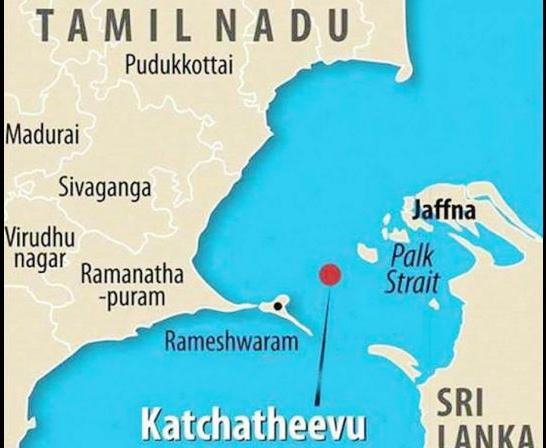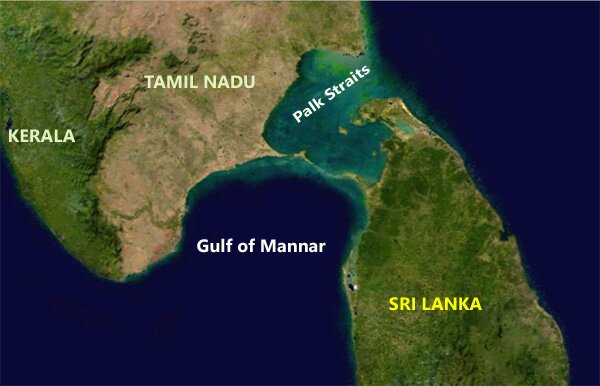International Relations
India-Sri Lanka Joint Working Group on Fisheries
- 31 Dec 2020
- 6 min read
Why in News
Recently, the Fourth Meeting of the India-Sri Lanka Joint Working Group (JWG) on Fisheries was held through virtual mode.
- Palk Strait and Gulf of Mannar are major fishing grounds for both the countries.
Key Points
- The Fourth Meeting:
- The two sides exchanged views on the status of cooperation between Navy & Coast Guard of both countries in patrolling, existing hotline between the Coast Guards and related operational matters, cooperation in preservation of marine environment as well as the schedule for the fifth meeting of the JWG.
- Sri Lanka also sought a safe passage for Sri Lankan fishermen to enter the Arabian Sea.
- India’s Stand:
- India reiterated the need for releasing all fishing boats in Sri Lankan custody in line with the commitment given by the Sri Lankan President during his state visit to India in November 2019.
- India highlighted the initiatives being taken under the new Pradhan Mantri Matsya Sampada Yojana and other schemes of Government of India and governments of Tamil Nadu and Puducherry to diversify and reduce fishing pressure in the Palk Bay.
- India also informed of initiatives taken for diversification into deep-sea fishing especially by fishermen of the Palk Bay area, infrastructure created to facilitate deep-sea fishing, promotion of alternative livelihood through seaweed cultivation, mariculture and varieties of aquaculture activities.
- Mariculture is the farming of marine organisms for food and other products such as pharmaceuticals, food additives, jewelry etc.
- The two sides exchanged views on the status of cooperation between Navy & Coast Guard of both countries in patrolling, existing hotline between the Coast Guards and related operational matters, cooperation in preservation of marine environment as well as the schedule for the fifth meeting of the JWG.
- Joint Working Group:
- India and Sri Lanka agreed to set up a Joint Working Group (JWG) on Fisheries in 2016 between the Ministry of Agriculture and Farmers Welfare of India and Ministry of Fisheries and Aquatic Resources Development of Sri Lanka as the mechanism to help find a permanent solution to the fishermen issue.
- The JWG also includes representatives from the Ministries of Foreign Affairs, the Coast Guards and Navies of both countries.
- Terms of reference of the JWG:
- Expediting the transition towards ending the practice of bottom trawling at the earliest.
- Bottom trawling is an industrial fishing method where a large net with heavy weights is dragged across the seafloor.
- When the weighted nets and trawl doors are dragged along the seafloor, everything in their path is disturbed or destroyed, including seagrasses, coral reefs or rock gardens where fish hide from predators.
- Framing procedures for returning fishermen arrested by both sides.
- Possibility of joint patrolling.
- Expediting the transition towards ending the practice of bottom trawling at the earliest.
Fisherman Issue
- Given the proximity of the territorial waters of both countries, especially in the Palk Strait and the Gulf of Mannar, incidents of straying of fishermen are common.
- Indian boats have been fishing in the troubled waters for centuries and had a free run of the Bay of Bengal, Palk Bay and the Gulf of Mannar until 1974 and 1976 when treaties were signed between the two countries to demarcate International Maritime Boundary Line (IMBL).
- However, the treaties failed to factor in the hardship of thousands of traditional fishermen who were forced to restrict themselves to a meagre area in their fishing forays.

- The small islet of Katchatheevu, hitherto used by the Indian fishermen for sorting their catch and drying their nets, fell on the other side of the IMBL.
- Fishermen often risk their lives and cross the IMBL rather than return empty-handed, but the Sri Lankan Navy is on alert, and have either arrested or destroyed fishing nets and vessels of those who have crossed the line.
- However, the treaties failed to factor in the hardship of thousands of traditional fishermen who were forced to restrict themselves to a meagre area in their fishing forays.
- Steps Taken:
- The IMBL is imaginary, but it was geo-tagged and is visible to the fishermen, due to Global Positioning System (GPS) sets.
- Deep Sea Fishing Scheme:
- Promoted as an alternative to bottom trawling by Tamil Nadu’s fishermen off the Palk Bay, the scheme envisages the provision of 2,000 deep sea fishing boats in place of trawlers by 2019-20, which will be the third and final year of implementation of the scheme.
- It aims to put an end to disputes arising between the two countries.
- It has been taken up under the ‘Blue Revolution’ scheme.
Way Forward
- India needs to focus more on its traditional and cultural ties to improve relations with Sri Lanka.
- Starting ferry services between India and Sri Lanka can improve people to people linkages.
- Mutual recognition of each other's concerns and interests can improve the relationship between both countries.





